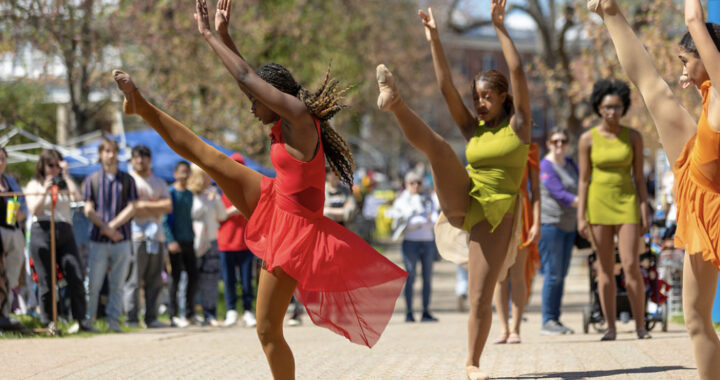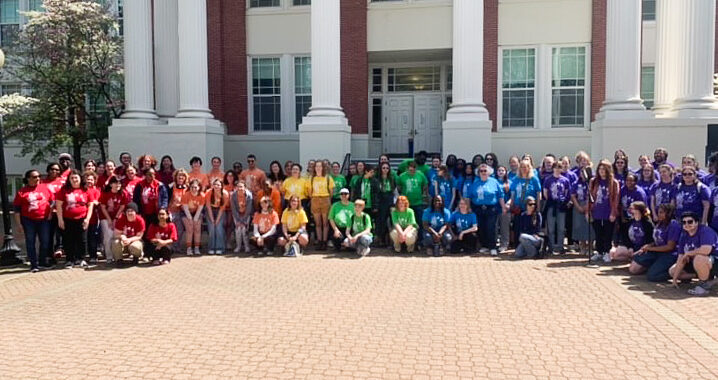Liberal Arts Majors Have to Face the Music After College
4 min readThe state of the economy makes finding a job after college harder than ever, particularly for those majoring in non-traditional subjects, such as music.
This added pressure has led several UMW students to change their majors from music to something they feel will be more practical.
Emilie Begin, a senior English major at UMW, considered pursuing a music degree until she recognized how difficult it would be to find a job.
“I realized it would really limit my career options after college,” she said. Instead, she found ways to continue singing without pursuing the major.
“Music is still one of my passions so I’ve been involved in on campus a capella groups since freshman year,” she said.
Megan Ortiz, a junior, recently changed her major from music to psychology.
Ortiz felt she “wasn’t good enough” to excel at music because the job market for chorus teachers is “very prestigious.” She opted to take part in the elective choruses rather than give up on music entirely.
Their fears of not finding a job may be warranted. According to Virginia Tech’s Post-Graduation Report, of the 16 people who graduated with a bachelor’s degree in music from Virginia Tech in 2008, only two of them were employed in their field as of March 31, 2009.
Of the 75 graduates who responded to James Madison University’s Alumni Employment and Graduate School Survey, 61% are currently employed. This survey addressed students from JMU’s music program who graduated between 2003 and 2005.
Though it seems like there is a shortage of career possibilities for music majors, many remain optimistic.
“I can tell you our majors, like all other music majors around the country, tap into the billion dollar music industry,” said Doug Gately, UMW’s Music Department career advisor.
Kelsey Mayo, a junior music major at UMW, already works teaching private voice lessons at Roberson’s Music while pursuing her degree.
Mayo said that music “is what [she] wants to spend time exploring.” Though she would love to perform for a living and is currently a vocalist in a local band, she doesn’t know if she will find a career in the music field, as it is “not the easiest thing to do.”
According to Career Services, music majors who decide to pursue a career that is not directly related to their major still experience great success.
According to a publication issued by the office, a recent study of 7,500 university students revealed that music majors scored the highest reading scores among all other majors including English, biology, and math.
The publication also cites a study that found that 66 percent of music majors who applied to medical school were admitted, the highest percentage of any undergraduate major. By comparison, 44 percent of biochemistry majors were admitted.
There are currently 30 declared music majors at UMW, according to Academic Services. Eight of them are also majoring in another field, such as psychology, English or chemistry.
Hannah von Oeyen, a junior at UMW, is pursuing degrees in both music and geography.
“I felt like it was a waste for me to not study something I’m so involved in already, so I decided to major in both,” she said.
She eventually plans to teach geography.
Career Services also offers a published list of job possibilities available to music majors. The options vary greatly and include working in education, performance, composition, conducting, music therapy, music library, communications, journalism, sales or law.
Elin Havrila from UMW’s class of 1973, majored in music and received a teaching certificate. Havrila has been teaching since she graduated, most recently at the Yamaha Music School of Fredericksburg.
Some alumni were not as lucky as Havrila, however. Alumna Nora McIntire said that finding a job after graduation was challenging. She said she worked as a bartender until pursuing a higher degree in Music Theory and Percussion Performance.
McIntire currently works as a paralegal with the Office of the Federal Public Defender in Richmond, VA. She has also worked as an assistant warehouse manager, warehouse manager and a corporate inventory control coordinator.
“[My current position] doesn’t relate,” McIntire said, “however I do workshops and seminars for hand bell choirs as often as I can, and that obviously does relate to my major.”
This approach seems to be what many of UMW’s alumni have taken.
Kristy Morgan, another graduate from the class of 1995, double majored in music and international affairs and works as a program specialist for the federal government agency, Corporation for National and Community Service.
Although this career path is not related to her music degree, Morgan pointed out, “I am still involved in music as I play in the hand bell choir at my church.”
“I’d like to continue to improve in music, and perhaps may take piano lessons again,” she said.
According to the survey released by JMU, of the 75 graduates who responded, 39 percent are currently in graduate school, pursuing an upper level music degree.
Mayo is still undecided about whether she wants to teach music after college. She said, “teaching in public school’s is very hard these days,” and is considering private voice lessons as an alternative.
Mayo also enjoys the business side of music and is considering going to graduate school to study music or business. Mayo believes the business side could open a lot of doors for her.
Joe Spiro, a junior composition major, is planning on continuing his education in graduate school to receive a master’s degree in composition. Spiro’s ultimate goal is to have a career writing film scores, but says “it’s a long arduous journey from breaking into the business to actually composing for feature films.”
Today music majors are in the same shape as students in all fields–looking for the best job choice and thinking about more schooling.
Jordan Kroll, Lauren Olsen, Jennifer Roed and Kathryn Ripley contributed to this report.











